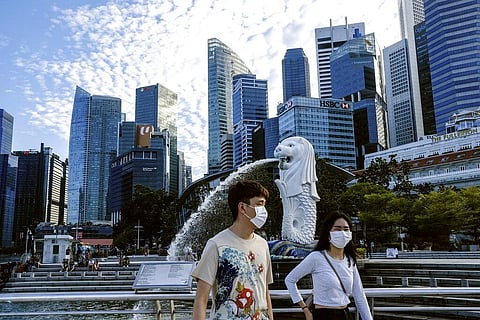

SINGAPORE: Reopening Singapore's borders is vital to the country's economic recovery, but doing so prematurely could result in another wave of COVID-19 infections, Finance Minister Lawrence Wong said in Parliament on Monday.
The priority, therefore, is to speed up vaccinations, he said.
"There has been feedbacks from the business and investment community that Singapore might lose out to other hubs that are moving more aggressively to reopen their borders," the Channel News Asia quoted Wong as saying.
"We understand these concerns. But we are also very mindful that if we were to reopen prematurely before we reach high enough vaccination levels, we could end up with another wave of infections, and worse, a surge in hospitalisation and ICU cases," said Wong, who co-chairs the COVID-19 multi-ministry task force.
In a ministerial statement outlining support measures amid the easing of some COVID-19 restrictions, Wong said the reopening of borders is "an existential issue" for Singapore, which thrives on connectivity.
Vaccinations will enable the country to progressively reopen and reconnect with the world, he said.
Wong said, "we are already discussing with other jurisdictions that have effectively controlled the infection, to work out travel corridors with them for vaccinated persons to travel more freely, either without the need for stay-home notice (SHN) or with a reduced SHN duration."
And while Singapore will not be able to prevent occasional imported infections, Wong said a high vaccination rate and the country's public health defences will prevent major outbreaks.
Beyond the immediate term, Wong said Singapore is investing in new capabilities and "building (itself) up strongly" for the future.
For instance, it is pushing ahead with digitalisation for businesses, intensifying efforts at upskilling the local workforce, as well as focusing on becoming a regional centre for green finance.
He informed the house that the Emerging Stronger Taskforce has set out many recommendations to better position Singapore for future growth, and authorities will develop new initiatives over the coming months to speed up progress on these plans.
To achieve these goals, Wong emphasised the need for partnerships across the community, and noted that the authorities will aim to scale up private-public collaborations.
Rounding up his speech, Wong reiterated that Singapore is preparing to transit to a scenario where people learn to live normally with COVID-19.
He said there are "promising signs" from countries that are ahead of Singapore in vaccinations, such as Israel, where almost 60 per cent of the population has been fully vaccinated.
Wong also said that a larger group of five people can be expected to be allowed to dine in together from July 12, as measures are eased and opened up further from a recent outbreak in community cases.
As of now, only a group of two people are allowed to dine in together at eateries.
"These additional measures have worked in curbing the spread of the virus, while allowing most parts of the economy to continue operating.
"So that is why we started to ease the restrictions from June 14, when we moved from phase two to phase three (heightened alert); and we expect to open up further from July 12 to allow larger groups of five people to dine together," he told the house.
To protect Singaporeans and control the spread of the virus, the country moved into phase two (heightened alert) on May 16.
Measures introduced were aimed at reducing transmission risks in indoor settings where people do not have their masks on, and where there is a higher chance of large clusters forming.
After a month of stepped-up precautions saw an eventual dip in cases, the authorities said on June 10 that Singapore would gradually reopen and move to phase three (heightened alert).
Meanwhile, the Ministry of Health is investigating a case of a 16-year-old boy who suffered cardiac arrest six days after receiving his first dose of COVID-19 vaccination.
The Singaporean youth did some weightlifting at the gym before he collapsed at home on July 3, said the Ministry of Health on Monday.
He was treated at the emergency department of a hospital and is in critical condition at the intensive care unit.
Singapore reported 13 new cases of COVID-19 on Monday, seven of which were people who arrived with infection, taking the total COVID-19 cases to 62,630.